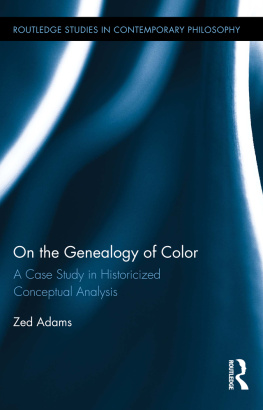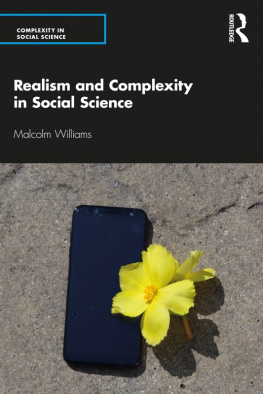On the Genealogy of Color
Adamss book offers a richly textured history of the interplay between theoretical components in our evolving concepts of color.
Jonathan Cohen, University of California San Diego, USA
This book is impressive not just because it shows how our ordinary concept of color involves incompatible commitments inherited from radically different philosophical theories of color, but because it also demonstrates how awareness of the history of philosophy can completely change how we think about contemporary debates.
Nat Hansen, University of Reading, UK
In On the Genealogy of Color , Zed Adams argues for a historicized approach to conceptual analysis, by exploring the relevance of the history of color science for contemporary philosophical debates about color realism. Adams contends that two prominent positions in these debates, Cartesian antirealism and Oxford realism, are both predicated on the assumption that the concept of color is ahistorical and unrevisable. Adams takes issue with this premise by offering a philosophical genealogy of the concept of color. This book makes a significant contribution to recent debates on philosophical methodology by demonstrating the efficacy of using the genealogical method to explore philosophical concepts, and will appeal to philosophers of perception, philosophers of mind, and metaphysicians.
Zed Adams is Associate Professor of Philosophy at The New School for Social Research, USA.
Routledge Studies in Contemporary Philosophy
For a full list of titles in this series, please visit www.routledge.com
41 Foundations of Freedom
Welfare-Based Arguments against Paternalism
Simon R. Clarke
42 Pittsburgh School of Philosophy
Sellars, McDowell, Brandom
Chauncey Maher
43 Reference and Structure in the Philosophy of Language
A Defense of the Russellian Orthodoxy
Arthur Sullivan
44 Civic Virtue and the Sovereignty of Evil
Derek Edyvane
45 Philosophy of Language and Webs of Information
Heimir Geirsson
46 Disagreement and Skepticism
Edited by Diego E. Machuca
47 Philosophy in Schools
An Introduction for Philosophers and Teachers
Edited by Sara Goering, Nicholas J. Shudak, and Thomas E. Wartenberg
48 A Philosophy of Material Culture
Action, Function, and Mind
Beth Preston
49 A Philosophy of the Screenplay
Ted Nannicelli
50 Race, Philosophy, and Film
Edited by Mary K. Bloodsworth-Lugo and Dan Flory
51 Knowledge, Virtue, and Action
Essays on Putting Epistemic Virtues to Work
Edited by Tim Henning and David P. Schweikard
52 The Ontology of Psychology
Questioning Foundations in the Philosophy of Mind
Linda A.W. Brakel
53 Pragmatism, Law, and Language
Edited by Graham Hubbs and Douglas Lind
54 Contemporary Dualism
A Defense
Edited by Andrea Lavazza and Howard M. Robinson
55 Reframing the Intercultural Dialogue on Human Rights
A Philosophical Approach
Jeffrey Flynn
56 How History Matters to Philosophy
Reconsidering Philosophys Past After Positivism
Robert C. Scharff
57 The Affordable Care Act Decision
Philosophical and Legal Implications
Edited by Fritz Allhoff and Mark Hall
58 Realism, Science, and Pragmatism
Edited by Kenneth R. Westphal
59 Evidentialism and Epistemic Justification
Kevin McCain
60 Democracy in Contemporary Confucian Philosophy
David Elstein
61 Deleuze and Pragmatism
Edited by Sean Bowden, Simone Bignall, and Paul Patton
62 Mind, Language and Subjectivity
Minimal Content and the Theory of Thought
Nicholas Georgalis
63 Believing Against the Evidence
Agency and the Ethics of Belief
Miriam Schleifer McCormick
64 The Essence of the Self
In Defense of the Simple View of Personal Identity
Geoffrey Madell
65 Personal Autonomy and Social Oppression
Philosophical Perspectives
Edited by Marina A.L. Oshana
66 Domination and Global Political Justice
Conceptual, Historical, and Institutional Perspectives
Edited by Barbara Buckinx, Jonathan Trejo-Mathys, and Timothy Waligore
67 Hate Speech Law
A Philosophical Examination
Alexander Brown
68 Music and Aesthetic Reality
Formalism and the Limits of Description
Nick Zangwill
69 Beyond the Analytic-Continental Divide
Pluralist Philosophy in the Twenty-First Century
Edited by Jeffrey A. Bell, Andrew Cutrofello, and Paul M. Livingston
70 Science and the Self
Animals, Evolution, and Ethics: Essays in Honour of Mary Midgley
Edited by Ian James Kidd and Liz McKinnell
71 Resisting Biopolitics
Philosophical, Political, and Performative Strategies
Edited by S.E. Wilmer and Audron ukauskait
72 Experiential Learning in Philosophy
Edited by Julinna Oxley and Ramona Ilea
73 On the Genealogy of Color
A Case Study in Historicized Conceptual Analysis
Zed Adams
On the Genealogy of Color
A Case Study in Historicized Conceptual Analysis
Zed Adams
First published 2016
by Routledge
711 Third Avenue, New York, NY 10017
and by Routledge
2 Park Square, Milton Park, Abingdon, Oxon OX14 4RN
Routledge is an imprint of the Taylor & Francis Group, an informa business
2016 Taylor & Francis
The right of Zed Adams to be identified as author of this work has been asserted by him in accordance with sections 77 and 78 of the Copyright, Designs and Patents Act 1988.
All rights reserved. No part of this book may be reprinted or reproduced or utilised in any form or by any electronic, mechanical, or other means, now known or hereafter invented, including photocopying and recording, or in any information storage or retrieval system, without permission in writing from the publishers.
Trademark Notice: Product or corporate names may be trademarks or registered trademarks, and are used only for identification and explanation without intent to infringe.
Library of Congress Cataloging-in-Publication Data
Adams, Zed.
On the genealogy of color: a case study in historicized conceptual analysis / Zed Adams. 1 [edition].
pages cm. (Routledge studies in contemporary philosophy; 73)
Includes bibliographical references and index.
Color (Philosophy) I. Title.
B105.C455A33 2015
111'.1dc23
2015027148
ISBN: 978-1-138-92814-5 (hbk)
ISBN: 978-1-315-68201-3 (ebk)
Typeset in Sabon
by Apex CoVantage, LLC
Dedicated to Rebecca Childers
The aim is not to doubt or debunk, but to understand.
John Haugeland
Contents
Preface
Disentangling Our Concept of Color
Nietzsche suggests that concepts influenced by history are like ropes held together by the intertwining of strands, rather than by a single strand running through the whole thing. To analyze such concepts is not to find necessary and sufficient conditions for their use but to disentangle the various strands that have become so tightly woven together by the process of historical development that they seem inseparable. Such analysis would take place most effectively in conjunction with historical theorizing, because it is the historical synthesis of strands that hides their separability from view, and it is thus by going back and forth between historical and conceptual considerations that one can hope to make progress in either the history or the conceptual analysis.
Maudemarie Clark, Nietzsches Immoralism and the Concept of Morality (1994)












